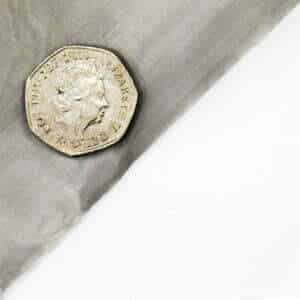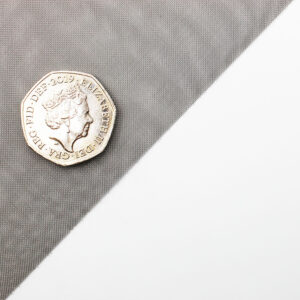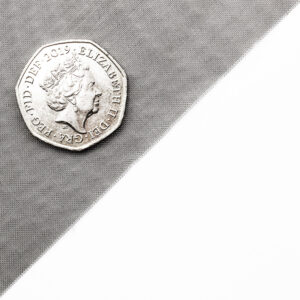







£11.99 – £349.99 inc VAT


This website is secured:
✔ The UK’s Largest Range Of Mesh Products
✔ FREE UK Delivery Included
✔ Immediate Express Dispatch From Stock
✔ Tracked Delivery with Order Updates
✔ 30-Day Returns Accepted
£ Check Out Our Clearance Listing For Savings
@ ☏ Bespoke Sizes & Larger Sheets Available
The brass mesh sheet, with its 0.204mm aperture, is a finely woven product designed for precision. Featuring a configuration of 100×100 holes per square inch and a thin 0.05mm wire, it ensures 65% open area, blending durability with breathability.
Notably, this mesh can be effortlessly tailored using just fingertips, making it a versatile and user-friendly option for varied applications.
Fine wire brass mesh sheet is made from solid brass wire. This is top-quality mesh that is especially suited to fine filtration and sieving. Fine brass mesh is ideal for filtering liquids, gases, or even solid materials. With its ultra-fine weave, it can capture even the smallest particles and impurities, ensuring a clean and reliable output. Brass is not a natural metal, but is an alloy of copper, zinc, and other elements, which also resists corrosion.
The brass mesh sheet with a 0.204mm aperture offers precision and quality in a single product. Designed meticulously with a 100×100 holes per square inch configuration, this fine woven wire mesh strikes the right balance between openness and material integrity, boasting an open area percentage of 65%. With a wire thickness of just 0.05mm, it exemplifies the best of fine craftsmanship and durability. One of its standout features is the ease of customisation. Unlike many other meshes that require tools for cutting, this brass mesh sheet can be tailored using just fingertips, reflecting its adaptability and user-friendly nature. Ideal for various applications, it seamlessly integrates into projects where precision, breathability, and aesthetics are paramount. For professionals and hobbyists alike seeking a blend of function and form, this mesh stands out as a top choice.
The specifications of this woven wire mesh are as below:
Wait!! Before you order your mesh please first check out our clearance listing which is where we put all of our over-run bargain rolls at reduced prices. You never know, you might find just the roll that you need for your purposes.
This mesh size is also available in copper and stainless steel.
Our group have been in the mesh industry for over 150 years. We are one of the UK’s most trusted woven mesh suppliers because:
The Mesh Company has an enormous range of woven wire mesh products. We truly are an industry leader among suppliers of weld mesh and woven wire materials. With the capabilities we have in-house, we can provide virtually anything you require.
Copper, stainless, black, and galvanised steel wire mesh materials are also available in large stock quantities at bargain prices. See our blog for specific information on all of our various
Brass is an alloy of copper and zinc, while stainless steel is an alloy of iron, carbon, and chromium. You can easily tell the difference between brass and stainless steel by knowing their compositions. For instance, iron is the only metal that makes ferrous metals rust fast. In terms of corrosion resistance, copper is better than iron. Brass is more corrosion-resistant than stainless steel. The addition of chromium to steel makes a whole lot of difference to its ability to resist rust, but it is still susceptible to corrosion at some degree.
Brass is the cheapest and most efficient metal when it comes to thermal and electrical conductivity, as well as having a higher expansion coefficient, making it perfect for high temperature applications. It also has the best machinability, which makes it the most popular metal for applications that require small, precise metal pieces.
Stainless steel is a widely used, durable metal. It can resist most acids, apart from highly concentrated nitric acid. Despite this, it is more corrosive-resistant than brass in marine environments, and it can be passivated in either citric or nitric acid.
Fine woven mesh refers to a type of mesh that has tightly woven wires or fibres, resulting in a high mesh count per inch.
The exact definition of fine woven mesh can vary depending on the application or industry, but generally, mesh with a mesh count of 100 or higher per inch is considered fine. The mesh specification in this listing is 100 mesh; which means that there are 100 holes per linear inch.
Fine woven mesh can be made from a variety of materials such as stainless steel, copper, brass, and are commonly used in applications such as filtration, sieving, screen printing, and mesh strainers.
The finest mesh that we stock has 500 holes per linear inch. This is super fine wire mesh, and is only possible to be produced as a woven wire cloth.
100 mesh refers to a mesh count per inch in a woven mesh screen. Specifically, it means that there are 100 openings or holes per linear inch of the screen. The size of the openings depends on the wire thickness and the weaving pattern, but in general, 100 mesh corresponds to openings that are approximately 0.149 mm or 149 microns in size. This mesh has a very fine wire, so the holes are larger than the standard, and the open area % is very high. Consequently, this material feels more like a cloth than a typical woven mesh.
The specific application of brass mesh depends on the size and properties of the mesh, but some common uses that our customers have had for this mesh include:
We would use fingertips alone. Cut two snips in the mesh and then pull the strip and this will make a really neat cut. This is easier than cutting along the line of apertures of the mesh as the holes are so fine they cannot be seen.
Check out our blog ‘everything that you need to know about brass wire mesh’ for more information on this product. Our goal for our blogs and help guides is to answer as many questions as possible to help to explain the possibilities of mesh to our customers. Contact our team today if you have any questions at all. We are always really keen to help in any way that we can.
You may also be interested in our blog about hardware cloth. This article explains the term in great detail.
We also offer similar products through our highly popular eBay store, check us out there too.
| Woven Mesh Sheet Size | 150 x 150mm x 2 Pack, A4 x 4 Pack (210 x 300mm x 4 Pack), 300 x 300mm (30 x 30cm) Sheet, A3 x 3 Pack (300 x 420mm x 3 Pack), 500 x 500mm (50 x 50cm) Sheet, A2 420 x 594mm (42 x 59.4cm) Sheet, A1 594 x 841mm (59.4 x 84.1cm) Sheet, 1000 x 500mm (100 x 50cm) Sheet, 1000 x 1000mm (100 x 100cm) Sheet, 5 Metre x 1000mm (1 Metre) Roll, 10 Metre x 1000mm (1 Metre) Roll |
|---|
In 2008 Locker Wire Weavers launched The Mesh Company to bring our enormous range of wire mesh products to the general public for the first time. Previously wire mesh was only available for trade customers.
We continue to extend our range, and now proudly offer many forms of mesh and metal products for the best possible prices. We specialise in woven wire mesh. As a group we work closely with architects and designers to develop ground-breaking new applications for our multifunctional range of materials. We also offer state of the art fabrication and engineering for projects of all sizes.
Strong ties with the Warrington community continue to be at the very core of our business. We are proud to invest in the training and developing our staff of all levels in line with the traditions set by Thomas Locker, who founded our group 150 years ago when he invented the electronic loom. We continue to bring ingenuity and strong ethics to our day to day business.
The Mesh Company continues Warrington’s historic role in the wire industry. For more than 140 years, our group has been a leader in the supply and manufacture of woven wire mesh and wire cloth. Having been founded in Warrington, UK in 1878, Locker mesh products still retain the quality craftsmanship and spirit of innovation that were so characteristic then.
Available Options
You will find full rolls of this insect netting here. Please be advised that the majority of woven mesh is usually available in a maximum roll size of 30 metres by 1200mm. Please email us if you wish to discuss purchasing this mesh in any size – sales@themeshcompany.com.
Feel free to call us if you wish to discuss any of our products – (+ 44) 01925 406 602. We are always happy to help in any way that we are able to.
We also offer this product through our highly popular eBay store, check us out there too.




The largest range of wire mesh, chicken wire, wire fencing, woven wire mesh and perforated metal products in Europe, delivered direct from our Warrington warehouse.




Website by: Beech Web Services | Terms and Conditions | Cookie Policy | Privacy Policy | Website Terms and Conditions
Reviews
There are no reviews yet.